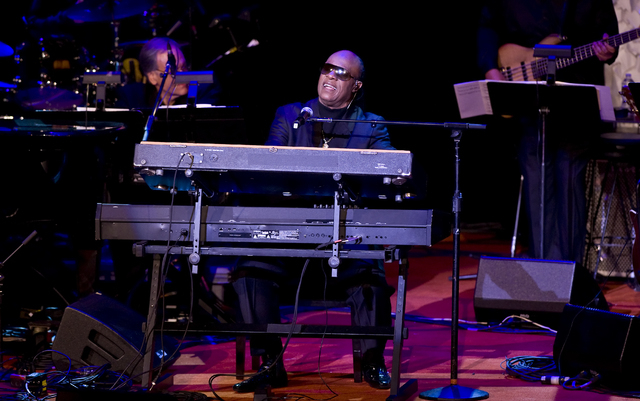Stevie Wonder to give ‘Life’ lesson
“Every problem has an answer,” he sings on an album ripe with both.
Stevie Wonder’s “Songs in the Key of Life” is 85 minutes of hope and frustration, love and loss, piety and defiance spread out over two bold, brilliant records and an EP.
Not only is it arguably Wonder’s greatest musical achievement, it ranks high on the list of the best albums ever.
With Wonder coming to town this weekend to perform “Songs in the Key of Life” in its entirety, let’s take a look at what’s made it an enduring classic:
It sounded like nothing else at the time
It’s not so much that the sounds that percolate throughout “Songs” were unprecedented — it was the way in which those sounds were integrated with one another that was.
“Songs” supersedes genre.
Take a tune like “Pastime Paradise,” for example.
It’s an odd pastiche of seemingly incongruous elements: Latin music percussion and rhythms set against a dramatic, orchestral backdrop with a choir of gospel-worthy vocals and Wonder at the center of it all, singing of segregation and exploitation in a voice positioned somewhere between melancholy and hope.
Yes, a gong is banged.
No, it shouldn’t make any sense at all.
But it does.
The whole album is full of moments like these, as Wonder created soul music in the most literal sense, defined not by a sound, but by whatever he was feeling in his soul at the time of the recording session.
As Wonder explained in a 1973 interview with Rolling Stone magazine: “I love gettin’ into just as much weird (expletive) as possible.”
On “Songs,” those possibilities were endless.
It made the personal political
On one song, he sings of the sting of a love cut short by a woman who’s stomped all over his heart in stiletto heels.
On the next, he pines for the orange snow of Saturn as a way to escape the warlike ways of us mere earthlings.
Throughout “Songs,” Wonder puts a human face — his face — on the social issues of the day by commingling candid, autobiographical tales of boyhood mischief with graphic denouncements of inner city poverty haunted by images of families subsisting on dog food, by alternating passionate testimonials to a woman’s beauty with songs that address the ongoing struggles of African-American ascension.
“Music is a world within itself / With a language we all understand,” Wonder sings on “Sir Duke,” and he uses this universal language to convey universal truths.
It was equally populist and progressive
It’s one thing to be ahead of the curve.
It’s another thing entirely to flatten said curve so that everyone else can inhabit the same plane.
This is what Wonder did with “Songs.”
It wasn’t just an audacious, adventurous listen, it was an audacious, adventurous listen that also had massive mainstream appeal, selling more than 10 million copies and topping the charts for 14 weeks.
Wonder always bracketed even his most far-out artistic inclinations in gorgeous melodies and studiously arranged songs so that his ideas could be digested easily — instantaneously, almost.
There’s great attention to detail on “Songs,” and with a good pair of headphones, you can explore the nuance and sonic minutiae that Wonder so carefully crafted with the 130 musicians who contributed to the record.
But far above all that, there’s an immediacy and an accessibility that often belies the album’s intricacies.
It would have been easy for “Songs” to become an unwieldy slog, one of those artistically laudable projects that’s impressive objectively but that you seldom reach for when you just want to hear some good tunes.
It could have become a curiosity, a well-intended study in form, the musical equivalent of a painting that requires an art degree to truly understand why it’s worth looking at.
Instead, Wonder embedded his many musical aspirations into songs that conveyed said aspirations as simply as the emotions conveyed in a kiss.
It represented new levels of artistic control
Stevie Wonder isn’t just a pioneer in music, he’s also a pioneer in the business of music.
When he signed his third contract with Motown Records in the early ’70s, he demanded — and received — ownership of his publishing, a first for anyone on the label, and a higher royalty rate than artists were used to getting back then.
“He broke tradition with the deal, legally, professionally — in terms of how he could cut his records and where he could cut,” Wonder’s attorney at the time, Johannan Vigoda, told Rolling Stone in 1973.
Two years later, when Wonder was contemplating quitting the music business to focus on charity work, he negotiated a new contract with Motown.
Besides being the biggest deal of its kind at the time — seven albums over seven years for $37 million — it gave Wonder complete creative control of his work, hence he was able to take his time and explore every artistic whim on “Songs.”
Not only did this lead to a masterwork for Wonder, but it established the precedent for successive musicians to seek the terms that would put them in the position to do the same.
It signaled the end of an era
Stevie Wonder wasn’t just a creative wellspring in the ’70s, he was a dam-burst of ideas. From 1970-74, he put out six albums, including back-to-back-to-back classics “Talking Book,” “Innervisions” and “Fulfillingness’ First Finale.”
“Songs” would come 2½ years after the latter record, which was practically a decade in Wonder years up to that point.
He’d released but one more ’70s album, the palate-cleansing, largely instrumental concept record/soundtrack “Stevie Wonder’s Journey Through ‘The Secret Life of Plants.’ ”
“Songs,” then, would serve as the apex of Wonder’s artistic ambition before he explored more commercial sounds in the ’80s, epitomized by hits like the heart-in-hand “I Just Called to Say I Love You” and philanderer’s anthem “Part-Time Lover.”
It was the final chapter in a book of songs that helped define a decade.
Contact reporter Jason Bracelin at jbracelin@reviewjournal.com or 702-383-0476. Follow on Twitter @JasonBracelin.
Preview
Stevie Wonder
8 p.m. Nov. 29
MGM Grand Garden arena, 3799 Las Vegas Blvd. South
$54.10-$191.70 (800-745-3000)






























